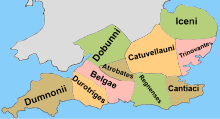Trinovants
The Trinovanten (also Trinobanten ) were in the late Iron Age a Celtic tribe of southeastern Britain before it was conquered by the Romans . They are known from some scattered remarks in Caesar's De bello Gallico commentary , Augustus ' Res gestae divi Augusti, and in the annals of the Roman historian Tacitus . Their settlement area was north of the Thames estuary in what is now Essex and Suffolk . Their northern neighbors were the Iceni and their western neighbors the Catuvellaunen .
Around the middle of the 1st century BC The Trinovantes belonged to the most powerful tribes in Britain. Your capital was probably Braughing (in today's Hertfordshire ). According to some manuscripts of Caesar 's De bello Gallico , its king at the time was called Imanuentius , although his name is missing in other manuscripts. Cassivellaunus , probably king of the Catuvellaunen, overthrew Imanuentius, whose son Mandubracius then sought protection from Caesar in Gaul . The Roman general defeated Cassivellaunus in the course of his second campaign in Britain and set Mandubracius in 54 BC. A king of the Trinovantes, who was left in peace by Cassivellaunus.
From coin finds it is known that Addedomarus was the next king of the Trinovantes who lived around 20–15 BC. Took power and moved the capital to Camulodunum (now Colchester ). At 10 BC BC probably the king of the Catuvellaunen, Tasciovanus , defeated the Trinovantes, as he minted coins in Camulodunum at that time. Perhaps under Roman pressure he would soon have to leave and Addedomarus was able to resume his old position. About 10 to 5 BC Addedomarus' son Dubnovellaunus succeeded him , but soon afterwards the kingdom of the Trinovantes was finally conquered by either Tasciovanus or his son Cunobelinus .
During the time of the Roman occupation of Britain after its conquest by Emperor Claudius (43 AD), the Trinovantes are mentioned in 60/61 AD as participants in Boudicca's revolt against the Romans. Caesaromagus (now Chelmsford ) is named as its main town now .
Geoffrey of Monmouth used in his unhistorical Historia Regum Britanniae the name of the Trinovanten in the form Trinovantum , as London was originally called. According to Monmouth, this name was derived from Troinovantum (= New Troy ), whereby the author linked this claim with the legend that Britain was founded by Brutus and other refugees from the Trojan War .
literature
- Trinovantes. In: The New Pauly (DNP). Volume 12/1, Metzler, Stuttgart 2002, ISBN 3-476-01482-7 , Col. 822. (with the thesis that Cunobelinus was a king of the Trinovantes)
